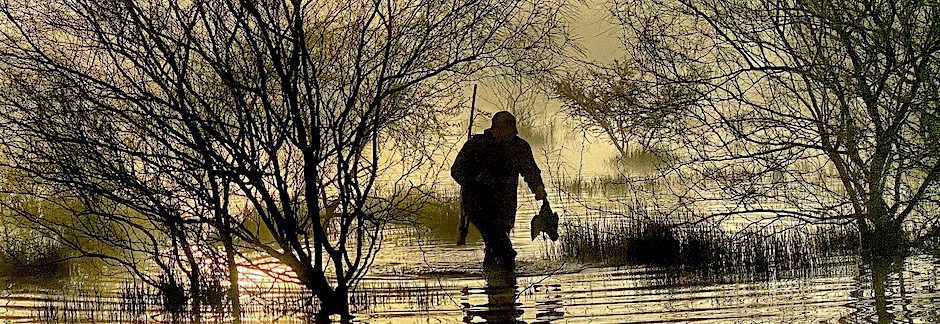MOJO’S Duck Season Somewhere Podcast
EP 379. Argentina Duck-Dove-Pigeon-Dorado Combo Couples Trip

This Argentina duck hunting combo has been a long-time client favorite, but besides hot-barrel action for ducks, doves, and decoying wild pigeons, what makes it really stand out? We 5 hunters brought our non-hunting spouses along, too. Fun-filled vacation for everyone? Tune in to hear how you really can have your cake and eat it too!
EP 378. Story-Driven Scientist

American evolutionary biologist Shane Campbell-Staton is host of the 6-part PBS documentary Human Footprint. He recounts some of the most interesting, funny and surprising experiences–like running down a river wearing a helmet and covered in fish slime. We wonder why some folks seem so disconnected from nature and who humans should be as a species. Check out Human Footprint on PBS, details below.
EP 377. “Making Turtle Soup”

“Making turtle soup,” is how today’s guest, Douglas Spale from Kansas City describes a round-about conversation of topics like the one we enjoy in today’s episode. Though he grew up hunting along Nebraska’s Platte River, a move to Chicago gave him the bug for travel hunting throughout the United States with a couple retriever and bird dog sidekicks, mixing it up on public land, and sharing his stories.
EP 376. Failproof Argentina Duck Hunting

Argentina’s ongoing drought is the worse since 1901, and in a landscape predominated by ephemeral wetlands, that’s a really big deal. Unless you’ve got a foolproof plan. Gathered before a roaring fire in a newly renovated, 1800s-era estancia, Ramsey joins the Argentina Duck Hunt Giveaway Contest Winner, first-time and long-time guests–and the outfitter that always makes it happen–to hear their perspectives about this trip-of-a-lifetime Argentina duck hunting experience.
EP 375. New Wildlife Management Paradigm: Remove Hunting-related Funding?

Hunting generates gazillions of dollars for wildlife conservation, and everyone in society benefits from wildlife conservation, right? Then why are anti-hunting organizations reinventing the world-envied North American Model by removing crucial hunting-related funding from wildlife management?! Just who the f-bomb are these groups, how are they replacing hard science with social science, how are they leveraging the public trust doctrine against us and–you can not make this stuff up–putting us all on the hook to foot the bill?! Todd Adkins, VP of Government Affairs, Sportsman’s Alliance, names names, explains how they are undermining our treasured hand-me-down hunting traditions and–get this–why they’re so damned much better at it than we are.
EP 374. Sport of Kings-style Duck Hunting

Falconry, an ancient sport dating back thousands of years, has been called the Sport of Kings. Casey Everett’s passion for falconry started humbly while observing manned hawks hunting squirrels during a homeschooling field trip. In a captivating exploration of this fascinating sport, Everett delves into the tight-knit falconry culture. He discusses selecting different bird species based on their personalities and hunting styles, as well as the processes of capturing, conditioning, and training falcons. Beyond hunting, Everett also highlights the diverse applications of falcons. This conversation intrigued me so much that my wife interrupted, mouthing the words “heck no!” Only she didn’t say heck.
EP 373. Something About Snows

There’s just something about snow geese—and what better way to muster through scorching hot summer days than talking about cooler weather while watching white birds spinning overhead?! Full-time waterfowl outfitter Mat Schauer of Northern Skies Outfitters hunts snow geese in Saskatchewan during the fall and spring, chasing them down their entire flyway and back again. Schaur and Ramsey compare hunting snow geese north of the border versus further south, and more.
Northern Skies Outfitters, Saskatchewan Canada Snow Goose Hunting
EP 372. The Pintail Paradox

These are interesting–and challenging–times. Especially for northern pintails and us duck hunters that hold these sprig-tailed, chocolate-headed beauties in high regard. On the one hand, science now demonstrates unequivocally that a 3-pintail bag limit will not affect pintail populations—and might be forthcoming in upcoming seasons! On the other hand, the continental pintail population is perilously close to the threshold below which there will be no hunting them at all in the Lower 48! Mitch Weegman is a young, savvy avian ecologist at University of Saskatoon that began researching waterfowl at a much, much younger age. Weegman walks us through the daunting pintail puzzle pieces, dispelling common pintail myths and offering a possible glimmer of hope.
EP 371. Full Steam Ahead: Making Ducks or Geese Happen

Like many others, Nick Johnson began waterfowl hunting with his dad, soon becoming the most skilled caller in the blind. And like many others, as he grew older he wanted to experience more of North America’s waterfowling than was available in his home state. Determined to create opportunities for himself, he hatched a plan. Now a guide for Prairie Limits Outfitters, he’s also developed the instructional Goose Tec mobile app and has his own signature call among the Pacific Calls’ lineup. Whether ducks or geese–or both–Nick offers advice for getting out there and making do-it-yourself hunts anywhere in happen. He and Ramsey offer another pro-tip, too, but don’t believe everything you hear or see on the internet!
EP 370. Giving Wildlife a Voice: A Retired Federal Game Warden Viewpoint

“Wildlife dies without a sound; the only voice is yours,” says retired US Fish and Wildlife Service Special Agent Rich Grosz in reference to soul-shaping life lessons gleaned as a child while patrolling with his dad, who was himself a larger-than-life federal game warden. Knowing in grade school he wanted to follow in his father’s footsteps, Grosz’s federal law enforcement career ran the thin green line gamut–wildlife inspector, refuge law enforcement, special agent. Even in retirement, his passion for wildlife, for waterfowl, and for conservation continues. His candid, matter-of-fact perspective offers meaningful insight into United States wildlife law enforcement at home and abroad.








